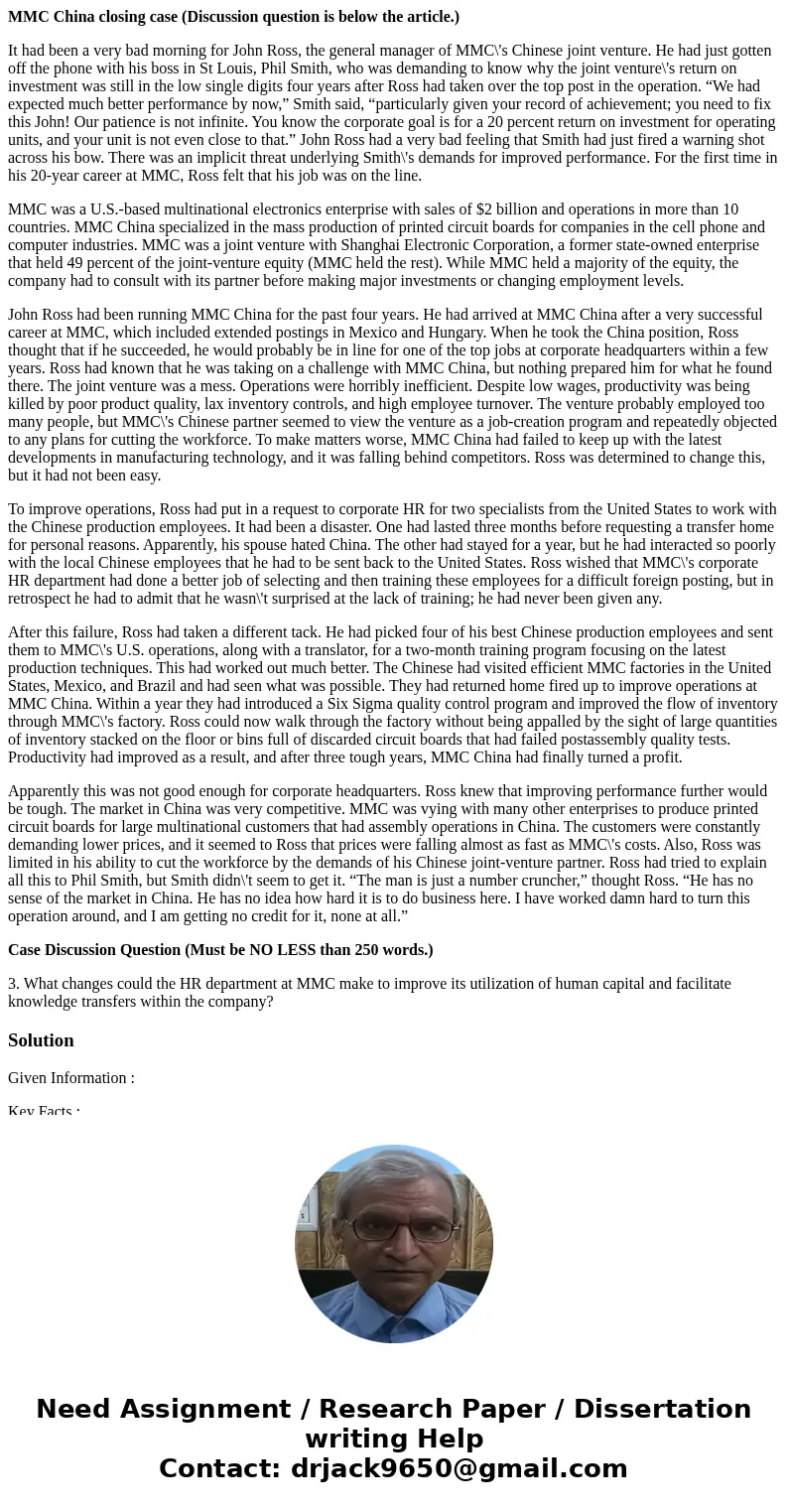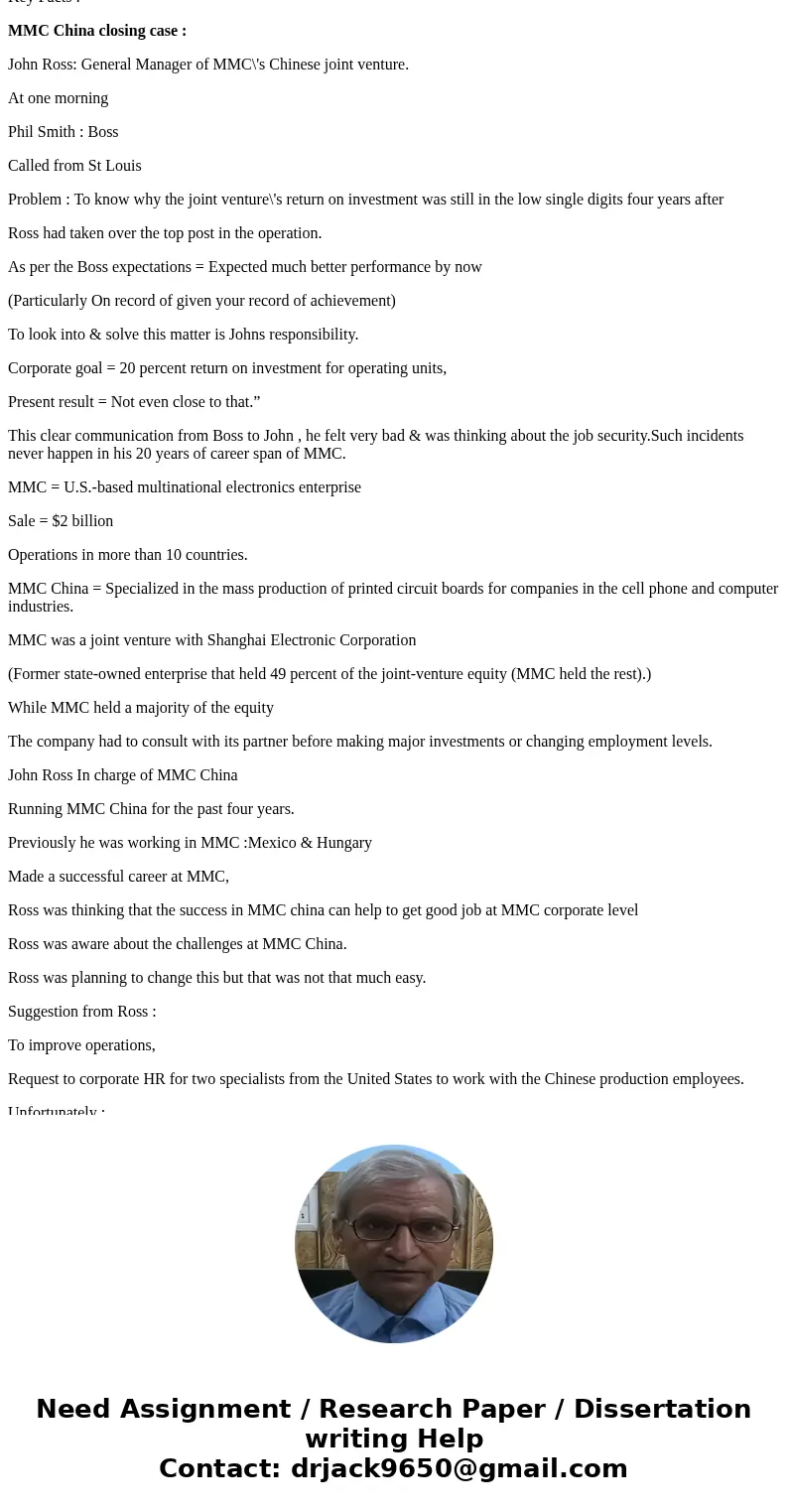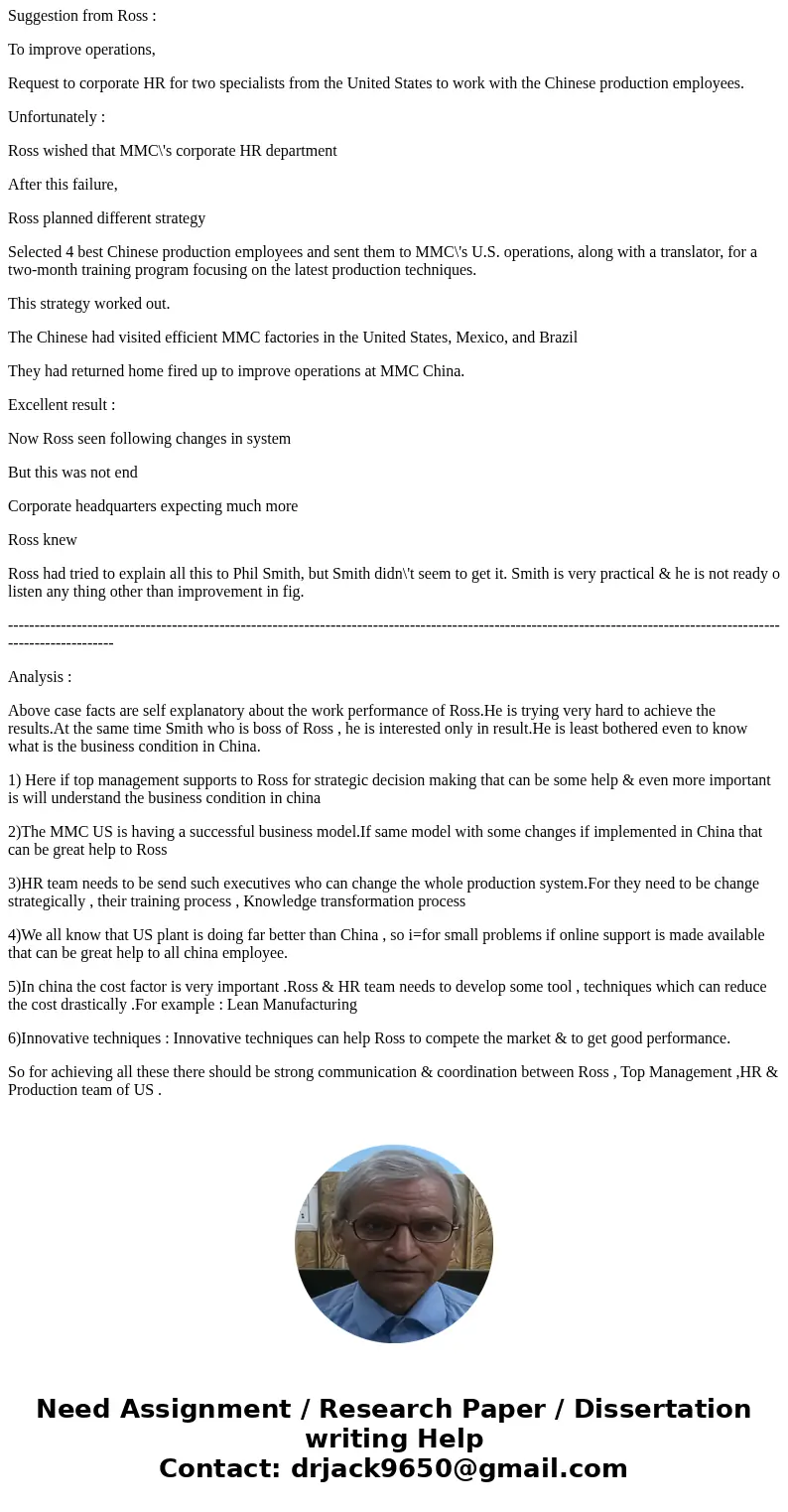MMC China closing case Discussion question is below the arti
MMC China closing case (Discussion question is below the article.)
It had been a very bad morning for John Ross, the general manager of MMC\'s Chinese joint venture. He had just gotten off the phone with his boss in St Louis, Phil Smith, who was demanding to know why the joint venture\'s return on investment was still in the low single digits four years after Ross had taken over the top post in the operation. “We had expected much better performance by now,” Smith said, “particularly given your record of achievement; you need to fix this John! Our patience is not infinite. You know the corporate goal is for a 20 percent return on investment for operating units, and your unit is not even close to that.” John Ross had a very bad feeling that Smith had just fired a warning shot across his bow. There was an implicit threat underlying Smith\'s demands for improved performance. For the first time in his 20-year career at MMC, Ross felt that his job was on the line.
MMC was a U.S.-based multinational electronics enterprise with sales of $2 billion and operations in more than 10 countries. MMC China specialized in the mass production of printed circuit boards for companies in the cell phone and computer industries. MMC was a joint venture with Shanghai Electronic Corporation, a former state-owned enterprise that held 49 percent of the joint-venture equity (MMC held the rest). While MMC held a majority of the equity, the company had to consult with its partner before making major investments or changing employment levels.
John Ross had been running MMC China for the past four years. He had arrived at MMC China after a very successful career at MMC, which included extended postings in Mexico and Hungary. When he took the China position, Ross thought that if he succeeded, he would probably be in line for one of the top jobs at corporate headquarters within a few years. Ross had known that he was taking on a challenge with MMC China, but nothing prepared him for what he found there. The joint venture was a mess. Operations were horribly inefficient. Despite low wages, productivity was being killed by poor product quality, lax inventory controls, and high employee turnover. The venture probably employed too many people, but MMC\'s Chinese partner seemed to view the venture as a job-creation program and repeatedly objected to any plans for cutting the workforce. To make matters worse, MMC China had failed to keep up with the latest developments in manufacturing technology, and it was falling behind competitors. Ross was determined to change this, but it had not been easy.
To improve operations, Ross had put in a request to corporate HR for two specialists from the United States to work with the Chinese production employees. It had been a disaster. One had lasted three months before requesting a transfer home for personal reasons. Apparently, his spouse hated China. The other had stayed for a year, but he had interacted so poorly with the local Chinese employees that he had to be sent back to the United States. Ross wished that MMC\'s corporate HR department had done a better job of selecting and then training these employees for a difficult foreign posting, but in retrospect he had to admit that he wasn\'t surprised at the lack of training; he had never been given any.
After this failure, Ross had taken a different tack. He had picked four of his best Chinese production employees and sent them to MMC\'s U.S. operations, along with a translator, for a two-month training program focusing on the latest production techniques. This had worked out much better. The Chinese had visited efficient MMC factories in the United States, Mexico, and Brazil and had seen what was possible. They had returned home fired up to improve operations at MMC China. Within a year they had introduced a Six Sigma quality control program and improved the flow of inventory through MMC\'s factory. Ross could now walk through the factory without being appalled by the sight of large quantities of inventory stacked on the floor or bins full of discarded circuit boards that had failed postassembly quality tests. Productivity had improved as a result, and after three tough years, MMC China had finally turned a profit.
Apparently this was not good enough for corporate headquarters. Ross knew that improving performance further would be tough. The market in China was very competitive. MMC was vying with many other enterprises to produce printed circuit boards for large multinational customers that had assembly operations in China. The customers were constantly demanding lower prices, and it seemed to Ross that prices were falling almost as fast as MMC\'s costs. Also, Ross was limited in his ability to cut the workforce by the demands of his Chinese joint-venture partner. Ross had tried to explain all this to Phil Smith, but Smith didn\'t seem to get it. “The man is just a number cruncher,” thought Ross. “He has no sense of the market in China. He has no idea how hard it is to do business here. I have worked damn hard to turn this operation around, and I am getting no credit for it, none at all.”
Case Discussion Question (Must be NO LESS than 250 words.)
3. What changes could the HR department at MMC make to improve its utilization of human capital and facilitate knowledge transfers within the company?
Solution
Given Information :
Key Facts :
MMC China closing case :
John Ross: General Manager of MMC\'s Chinese joint venture.
At one morning
Phil Smith : Boss
Called from St Louis
Problem : To know why the joint venture\'s return on investment was still in the low single digits four years after
Ross had taken over the top post in the operation.
As per the Boss expectations = Expected much better performance by now
(Particularly On record of given your record of achievement)
To look into & solve this matter is Johns responsibility.
Corporate goal = 20 percent return on investment for operating units,
Present result = Not even close to that.”
This clear communication from Boss to John , he felt very bad & was thinking about the job security.Such incidents never happen in his 20 years of career span of MMC.
MMC = U.S.-based multinational electronics enterprise
Sale = $2 billion
Operations in more than 10 countries.
MMC China = Specialized in the mass production of printed circuit boards for companies in the cell phone and computer industries.
MMC was a joint venture with Shanghai Electronic Corporation
(Former state-owned enterprise that held 49 percent of the joint-venture equity (MMC held the rest).)
While MMC held a majority of the equity
The company had to consult with its partner before making major investments or changing employment levels.
John Ross In charge of MMC China
Running MMC China for the past four years.
Previously he was working in MMC :Mexico & Hungary
Made a successful career at MMC,
Ross was thinking that the success in MMC china can help to get good job at MMC corporate level
Ross was aware about the challenges at MMC China.
Ross was planning to change this but that was not that much easy.
Suggestion from Ross :
To improve operations,
Request to corporate HR for two specialists from the United States to work with the Chinese production employees.
Unfortunately :
Ross wished that MMC\'s corporate HR department
After this failure,
Ross planned different strategy
Selected 4 best Chinese production employees and sent them to MMC\'s U.S. operations, along with a translator, for a two-month training program focusing on the latest production techniques.
This strategy worked out.
The Chinese had visited efficient MMC factories in the United States, Mexico, and Brazil
They had returned home fired up to improve operations at MMC China.
Excellent result :
Now Ross seen following changes in system
But this was not end
Corporate headquarters expecting much more
Ross knew
Ross had tried to explain all this to Phil Smith, but Smith didn\'t seem to get it. Smith is very practical & he is not ready o listen any thing other than improvement in fig.
----------------------------------------------------------------------------------------------------------------------------------------------------------------------
Analysis :
Above case facts are self explanatory about the work performance of Ross.He is trying very hard to achieve the results.At the same time Smith who is boss of Ross , he is interested only in result.He is least bothered even to know what is the business condition in China.
1) Here if top management supports to Ross for strategic decision making that can be some help & even more important is will understand the business condition in china
2)The MMC US is having a successful business model.If same model with some changes if implemented in China that can be great help to Ross
3)HR team needs to be send such executives who can change the whole production system.For they need to be change strategically , their training process , Knowledge transformation process
4)We all know that US plant is doing far better than China , so i=for small problems if online support is made available that can be great help to all china employee.
5)In china the cost factor is very important .Ross & HR team needs to develop some tool , techniques which can reduce the cost drastically .For example : Lean Manufacturing
6)Innovative techniques : Innovative techniques can help Ross to compete the market & to get good performance.
So for achieving all these there should be strong communication & coordination between Ross , Top Management ,HR & Production team of US .



 Homework Sourse
Homework Sourse